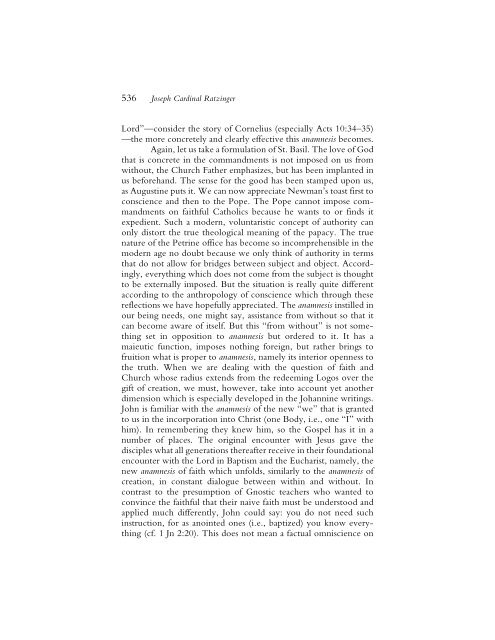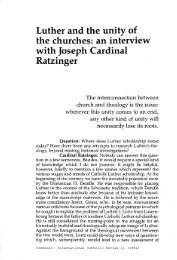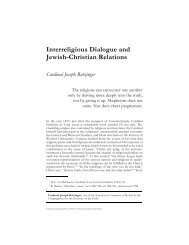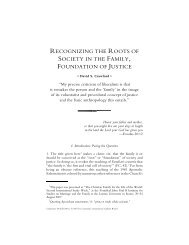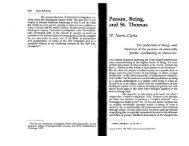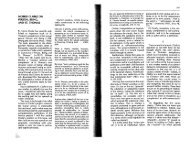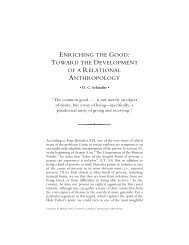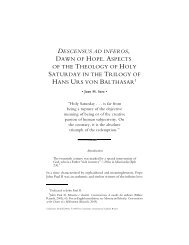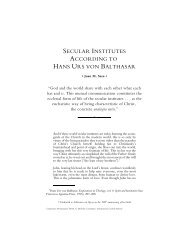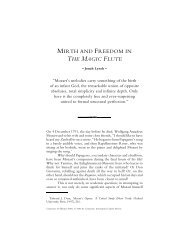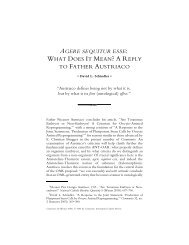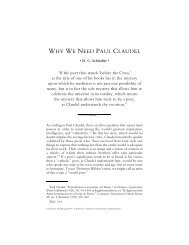Joseph Ratzinger. Conscience and Truth. Communio 37 (2010)
Joseph Ratzinger. Conscience and Truth. Communio 37 (2010)
Joseph Ratzinger. Conscience and Truth. Communio 37 (2010)
Create successful ePaper yourself
Turn your PDF publications into a flip-book with our unique Google optimized e-Paper software.
536 <strong>Joseph</strong> Cardinal <strong>Ratzinger</strong>Lord”—consider the story of Cornelius (especially Acts 10:34–35)—the more concretely <strong>and</strong> clearly effective this anamnesis becomes.Again, let us take a formulation of St. Basil. The love of Godthat is concrete in the comm<strong>and</strong>ments is not imposed on us fromwithout, the Church Father emphasizes, but has been implanted inus beforeh<strong>and</strong>. The sense for the good has been stamped upon us,as Augustine puts it. We can now appreciate Newman’s toast first toconscience <strong>and</strong> then to the Pope. The Pope cannot impose comm<strong>and</strong>mentson faithful Catholics because he wants to or finds itexpedient. Such a modern, voluntaristic concept of authority canonly distort the true theological meaning of the papacy. The truenature of the Petrine office has become so incomprehensible in themodern age no doubt because we only think of authority in termsthat do not allow for bridges between subject <strong>and</strong> object. Accordingly,everything which does not come from the subject is thoughtto be externally imposed. But the situation is really quite differentaccording to the anthropology of conscience which through thesereflections we have hopefully appreciated. The anamnesis instilled inour being needs, one might say, assistance from without so that itcan become aware of itself. But this “from without” is not somethingset in opposition to anamnesis but ordered to it. It has amaieutic function, imposes nothing foreign, but rather brings tofruition what is proper to anamnesis, namely its interior openness tothe truth. When we are dealing with the question of faith <strong>and</strong>Church whose radius extends from the redeeming Logos over thegift of creation, we must, however, take into account yet anotherdimension which is especially developed in the Johannine writings.John is familiar with the anamnesis of the new “we” that is grantedto us in the incorporation into Christ (one Body, i.e., one “I” withhim). In remembering they knew him, so the Gospel has it in anumber of places. The original encounter with Jesus gave thedisciples what all generations thereafter receive in their foundationalencounter with the Lord in Baptism <strong>and</strong> the Eucharist, namely, thenew anamnesis of faith which unfolds, similarly to the anamnesis ofcreation, in constant dialogue between within <strong>and</strong> without. Incontrast to the presumption of Gnostic teachers who wanted toconvince the faithful that their naive faith must be understood <strong>and</strong>applied much differently, John could say: you do not need suchinstruction, for as anointed ones (i.e., baptized) you know everything(cf. 1 Jn 2:20). This does not mean a factual omniscience on


